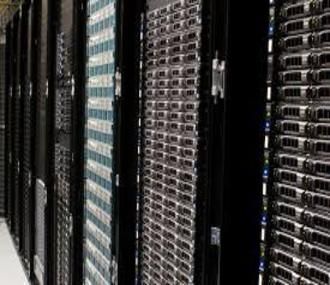When we were younger, we used to think that the world is such a big place. There are so many places to go to and sights to see. People’s language is not the same in different parts of the globe and that used to scare us from going out of our comfort zones. Yet that thought does not scare us anymore. While the world may still be big geographically and cultural and language differences are still as big of an obstacle as it was before, it has become somewhat closer and interconnected. What made it possible? Technology. The rapid rise and popularity of the Internet has bridged thousands of miles of distance and made a lot of things readily available in real-time regardless of the time zone.
 What makes all these things happen then? We may talk about the Internet as if we know it like the back of our hands but in reality, what powers the web are countless computer servers that serve as the backbone of the World Wide Web that we know. The web itself and all the multitude of websites and pages populating this virtual platform are supported by PC servers that work nonstop in collecting/gathering, storing, and processing data and making sure everything is readily available when the need arises. What it is capable of doing right now is already mind-blowing but the upcoming innovations to it will definitely get you shook all the more.
What makes all these things happen then? We may talk about the Internet as if we know it like the back of our hands but in reality, what powers the web are countless computer servers that serve as the backbone of the World Wide Web that we know. The web itself and all the multitude of websites and pages populating this virtual platform are supported by PC servers that work nonstop in collecting/gathering, storing, and processing data and making sure everything is readily available when the need arises. What it is capable of doing right now is already mind-blowing but the upcoming innovations to it will definitely get you shook all the more.
A company’s technology stack functions much like an orchestra; many parts working together in harmony, but if one instrument is too slow or out of tune, the entire company runs less effectively. Concertio, previously known as DatArcs, serves as an AI-driven maestro that optimizes and orchestrates your software and hardware deployments. When deploying and maintaining your server, there are a myriad of options that can be configured and optimizing this architecture across your technology stack ensures that the show runs smoother.
AlleyWatch chatted with CEO and cofounder Tomer Morad to learn more about the company, the need its solving, and where it plans to go next.
(Via: http://www.alleywatch.com/2018/03/concertio-uses-ai-to-optimize-your-servers/)
The web and everything else connected to it can work effectively and efficiently if all parts are working perfectly or else your system will suffer alongside the overall user experience too. Users will experience connectivity issues or constantly get interrupted when accessing specific sites because the servers can’t meet user demands. With AI expected to hit the mainstream in a decade or so, servers are gradually upgraded and AI technology is integrated to optimize server features and performance. Only servers that are able to innovate and adapt to the rapidly progressing technology will make it big later on.
Does something need checking out in your data center? Before you send out a technician, why not send out a robot?
That’s the upshot of a newly published Amazon patent for mobile robots that are designed to respond to the report of a glitch, check out the computer server that may be having an issue, hook into it if necessary and gather data for a fix.
The system, described in an application that was filed back in 2014, even calls for having the machine use its robotic manipulator to pull out a suspect part and install a replacement if need be.
There’s no sign that Amazon Web Services already has robotic IT workers on the job, servicing the hundreds of thousands of computer servers it has in data centers around the globe. Plenty of patents never get implemented, and Amazon didn’t immediately respond to GeekWire’s emailed inquiry about its intentions.
(Via: https://www.geekwire.com/2018/service-computer-server-send-robots-amazon-patent-says/)
And seeing how many servers are needed right now to power the web and everyone else that is using it, it is common to see servers breaking down more often than we’d like it to be. To prevent this from happening, the idea of mobile robots being used to fix it first instead of technicians is something that Amazon entertains. These servers ought to work round-the-clock as people are constantly using the site for a variety of services and having them down can prove costly to the business. The robots can effortlessly do the job of periodic maintenance, something that humans have a hard time keeping up with. Some people may try to fight off innovation but perhaps they’re not that bad at all especially when done right.
In the case of smaller servers unlike the ones backing up Amazon, services like https://www.harddriverecovery.org/raidcenter/dell_poweredge_data_recovery.html and https://www.harddriverecovery.org/raidcenter/hp-proliant-data-recovery.html can save it from breakdowns and help it get running back up again to keep the business going at more reasonable prices. We can’t stop technology from pushing forward, so the least we can do is ride the tide and embrace all these innovations while we are at it.
42c07f7f4ed3da5e2b17ff80184aca1c09c0d2cc98cfc328fb1b32a3f56d278642c07f7f4ed3da5e2b17ff80184aca1c09c0d2cc98cfc328fb1b32a3f56d2786postlink42c07f7f4ed3da5e2b17ff80184aca1c09c0d2cc98cfc328fb1b32a3f56d278642c07f7f4ed3da5e2b17ff80184aca1c09c0d2cc98cfc328fb1b32a3f56d2786 is republished from http://www.harddriverecovery.org
source https://www.harddriverecovery.org/blog/computer-servers-make-the-world-go-round/
No comments:
Post a Comment